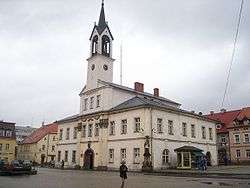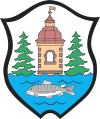Lubawka
| Lubawka | |||
|---|---|---|---|
|
Town hall | |||
| |||
 Lubawka | |||
| Coordinates: 50°42′12″N 16°0′7″E / 50.70333°N 16.00194°E | |||
| Country |
| ||
| Voivodeship | Lower Silesian | ||
| County | Kamienna Góra | ||
| Gmina | Lubawka | ||
| Area | |||
| • Total | 22.44 km2 (8.66 sq mi) | ||
| Population (2006) | |||
| • Total | 6,529 | ||
| • Density | 290/km2 (750/sq mi) | ||
| Website | http://www.lubawka.net.pl | ||
Lubawka [luˈbafka] (German: Liebau) is a town in Poland, in Lower Silesia Voivodship, in Kamienna Góra County. It is the administrative seat of Gmina Lubawka. It lies in the area of Central Sudetenland near to the border with the Czech Republic on the way across the Lubawka pass (516m) between the Karkonosze and Crow Mountains (Czech: Vranní hory). Two small rivers, the Bóbr and Czarnuszka, run through the town, which has 6,529 inhabitants (2006). It was part of the German Republic before World War II after which the ethnic Germans were expelled.
History
The first written reference to Lubawka is from 1284. From 1292 to 1810 it belonged to the Cistercian monastery in Krzeszów (German: Grussau). The whole domain devolved to the Czech Kingdom in 1392. The town was destroyed twice during the Hussite wars in 1425 and 1431. From 1526 it become part of the Habsburg Empire. Another great war disaster hit Lubawka when the Swedish army during the Thirty Years War totally despoiled the city which was abandoned by its inhabitants for more than six months. The city developed rapidly in the 18th century, particularly due to growth in the textile industry there and in surrounding villages. Unfortunately several great fires damaged the city in those times. The largest one in 1734 destroyed the town hall, school, church, vicarage and almost all buildings.
In 1810 when the Cistercian monastery in Krzeszów was abolished, Lubawka in conjunction with Chełmsko Śląskie began to develop on their own. The railway, a great incentive to faster development, arrived in Lubawka from Sędzisławia in 1867. Several years later it was extended to Královec (German: Königshof) and connected with Žacléř (German: Schatzlar) and Trutnov (German: Trautenau) which are now part of the Czech Republic. In those times coal mining reached prosperity.
At the end of 19th century Lubawka and the surrounding villages became very well known as a destination for tourism. The German Olympic team used a facility built near Lubawka to prepare for the Berlin Olympic Games in 1936.
During the era of the Third Reich the facility was used by Hitler-Jugend as a training and recreation center. In 1944 there was established in the city a branch of KZ Gross-Rosen for 500 Jewish women delivered from Auschwitz.
On May 7, 1945 the town was occupied by the Soviet Red Army; approximately 1,000 German war refugees resided in Lubawka together with 6,300 resident citizens at that time. Virtually all of them were displaced to Germany between 1945 and 1947. The whole area including Lubawka was populated by Poles transferred from the eastern parts of Poland occupied by and annexed to the Soviet Union, and from the neighborhood of Nowy Sącz in southeast Poland.
Pop music references
The town is mentioned in the version of the 1964 song Universal Soldier by Buffy Sainte-Marie released in 1965 by Scottish singer Donovan; the original used Dachau.[1]
Places of interest
- Town hall from 18th century
- Parish church from 17th century
- Raven Rocks (Polish: Krucze Skały)
- Calvary on the Holy Mountain (Polish: Kalwaria na Świętej Górze)
- Valley of Mercy (Polish: Dolina Miłości)
Notable Citizens
- Wolfgang Liebeneiner (1905-1987), actor
- Otto Mueller (1874-1930), painter and lithographer
- Johann-Georg Richert (1890–1946), Wehrmacht general
- Edgar Röhricht (1892–1967), Wehrmacht general
- Ryszard Zbrzyzny (*1955)
References
External links
| Wikimedia Commons has media related to Lubawka. |
Coordinates: 50°42′12″N 16°00′07″E / 50.70333°N 16.00194°E


